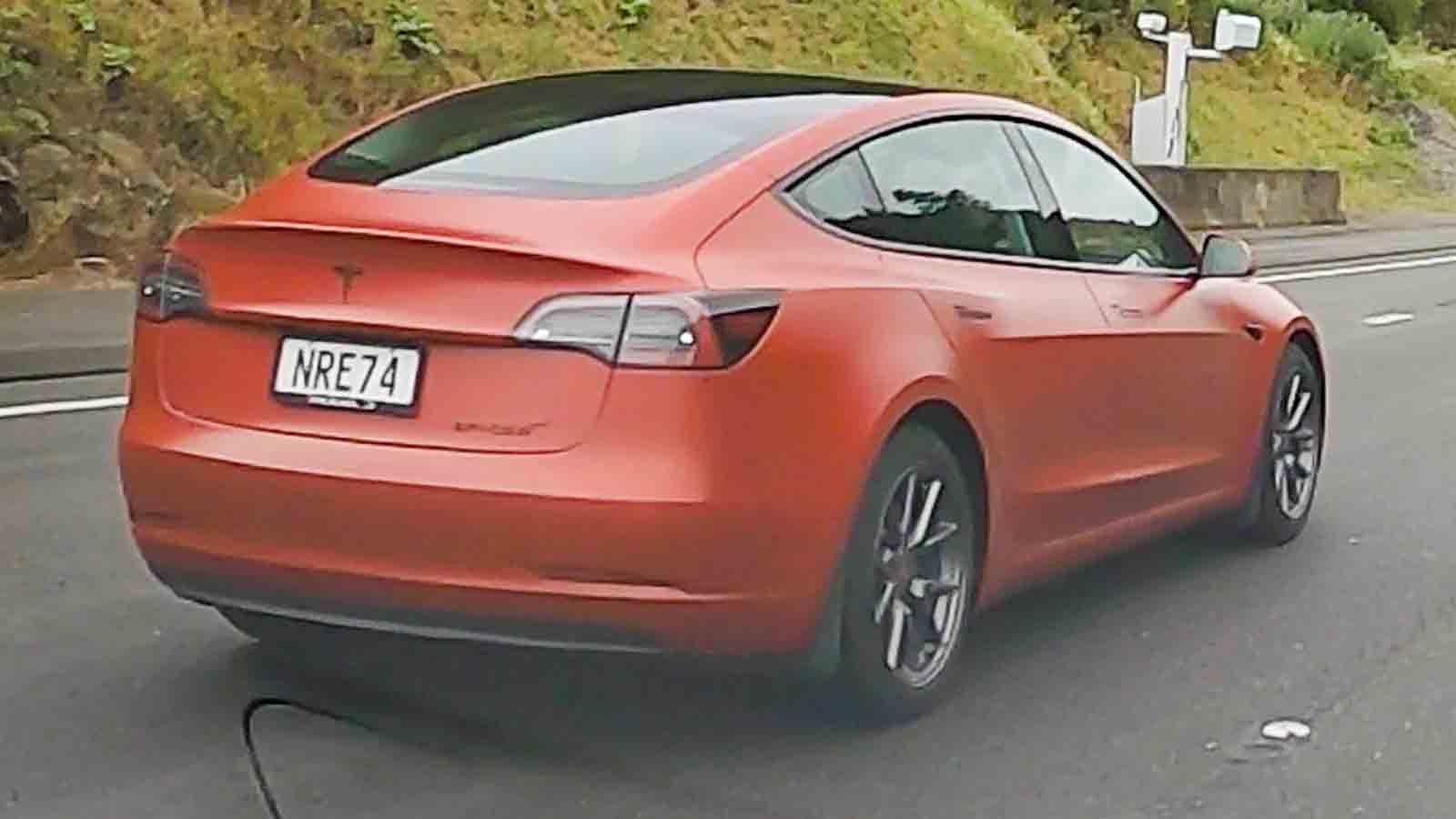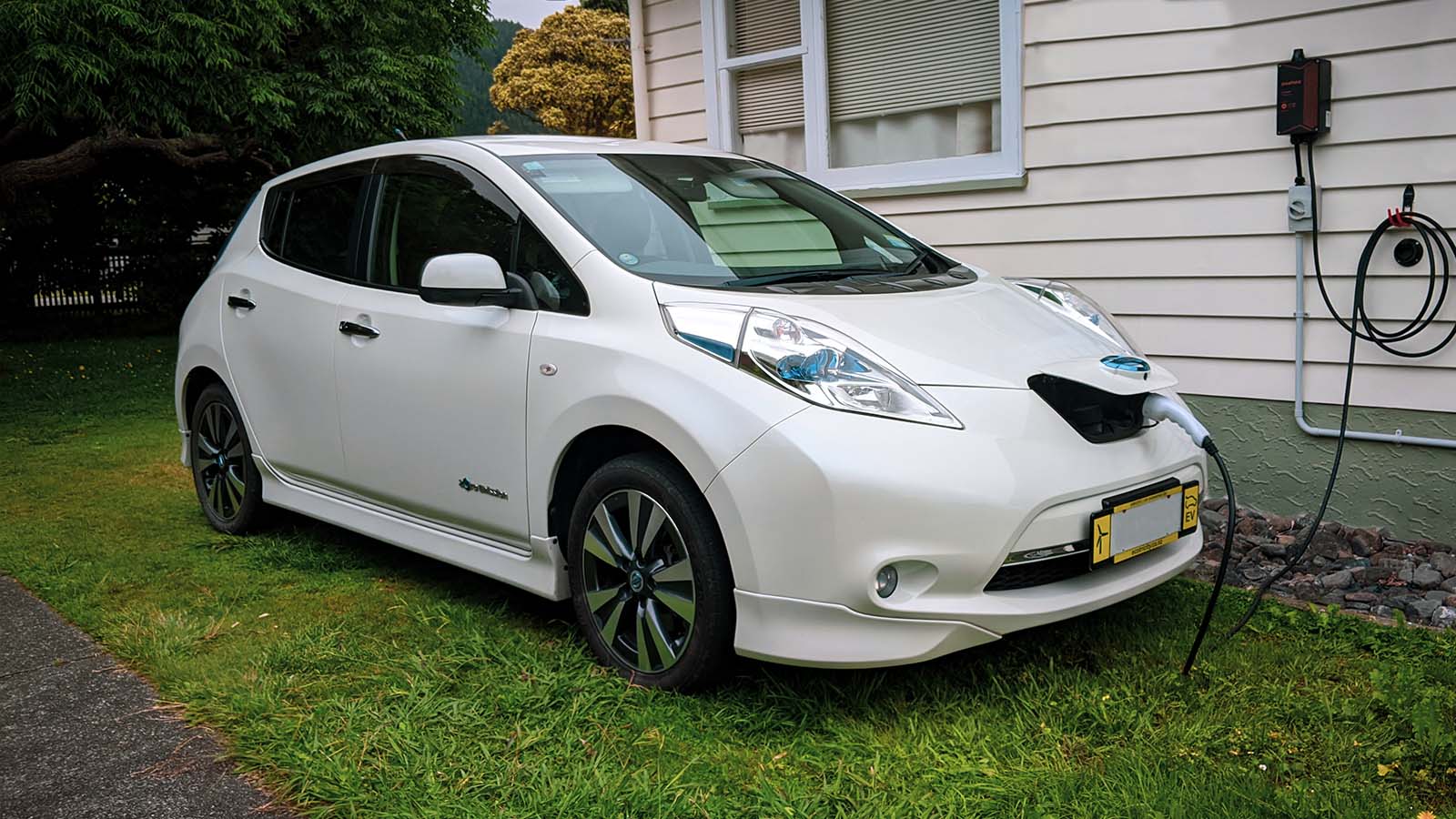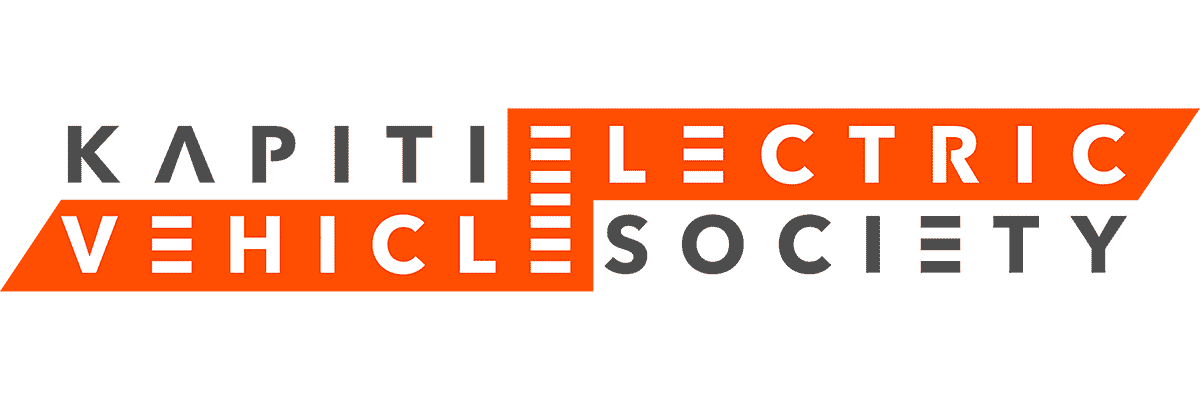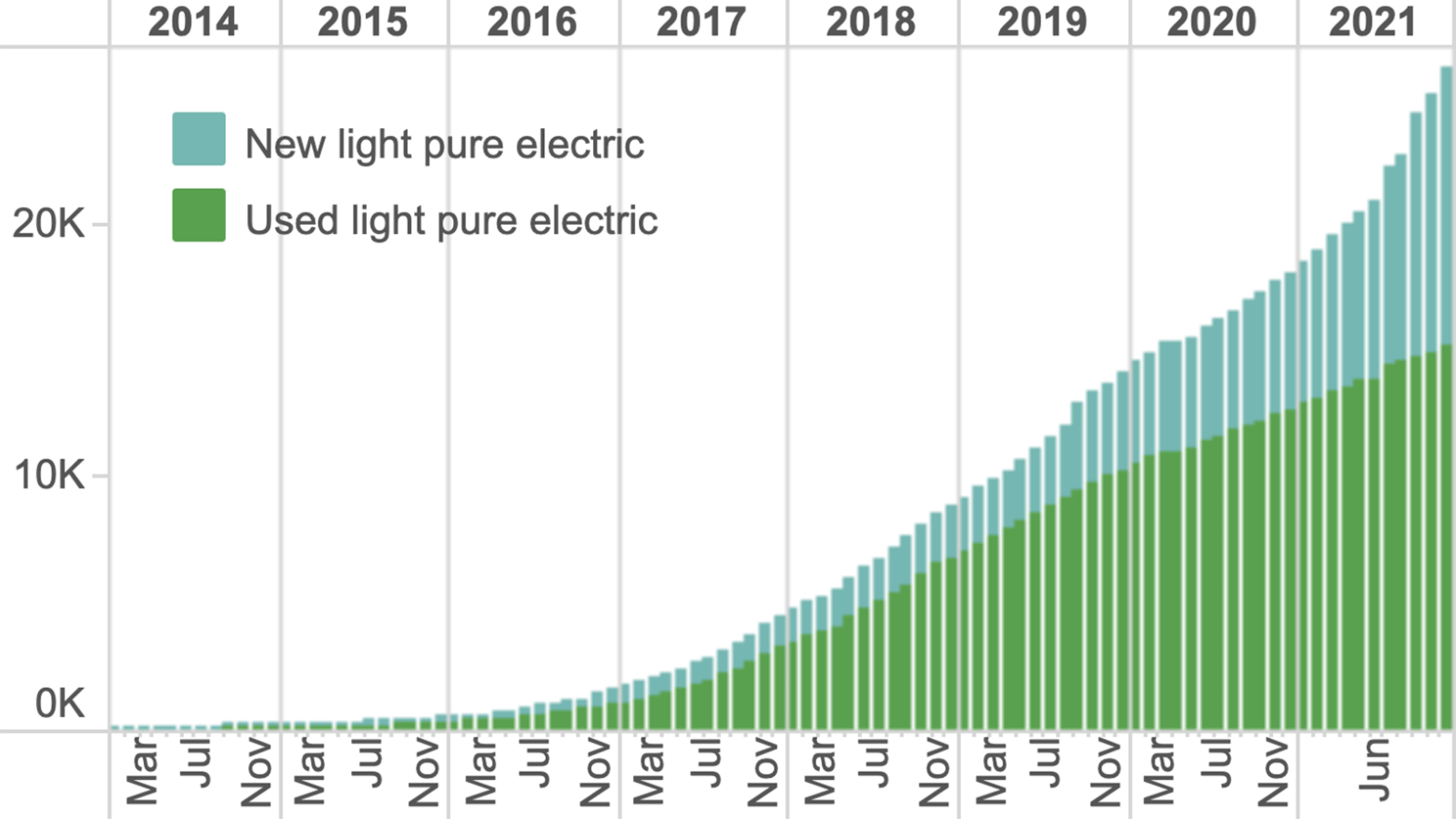Electric Vehicle statistics and insights
Electric Vehicle statistics and insights gives us a glimpse into the growing adoption of electrically powered vehicles in Aotearoa NZ.
Total number of registered electric vehicles
As of November 2021, the total number of pure electric vehicles registered in Aotearoa NZ is: Total 26,215
This breaks down into 10,927 new EVs and 15,288 used EVs.
At present, there are approximately 4.4 million vehicles registered in Aotearoa NZ. Therefore, about 0.59% are currently pure EVs. This is slightly up on the previous month figure of 0.57%
Aotearoa New Zealand’s most popular electric vehicles:

Tesla Model 3 is Aotearoa New Zealand’s most popular new electric vehicle: 3,819

Nissan Leaf is Aotearoa New Zealand’s most popular used electric vehicle: 13,909
New EVs
Our first table shows the most popular makes and models of new electric vehicles registered in Aotearoa New Zealand, between 2018 and 2021. Statistics prior to 2018 are available here: Ministry of Transport – statistics and insights
| Make | Model | 2018 | 2019 | 2020 | 2021 | Total |
|---|---|---|---|---|---|---|
| Audi | E-Tron | – | 92 | 81 | 137 | 310 |
| BMW | I | 31 | 46 | 29 | 33 | 211 |
| Hyundai | Ioniq | 211 | 160 | 47 | 180 | 807 |
| Hyundai | Ioniq 5 | – | – | – | 165 | 165 |
| Hyundai | Kona | 106 | 395 | 236 | 687 | 1,424 |
| Jaguar | i-Pace | 2 | 92 | 61 | 36 | 191 |
| Kia | Niro | – | 71 | 37 | 194 | 302 |
| LDV | eDeliver 3 | – | – | 1 | 59 | 60 |
| Mazda | MX-30 | – | – | – | 42 | 42 |
| Mercedes-Benz | EQA | – | – | – | 63 | 63 |
| Mercedes-Benz | EQC | – | 1 | 37 | 99 | 137 |
| MG | ZS | – | 2 | 118 | 136 | 254 |
| Mini | Hatch | – | – | 53 | 111 | 164 |
| Nissan | Leaf | 1 | 83 | 142 | 86 | 349 |
| Peugeot | 208 | – | – | – | 64 | 64 |
| Peugeot | 2008 | – | – | – | 24 | 24 |
| Polestar | Polestar 2 | – | – | – | 12 | 12 |
| Porsche | Taycan | – | – | 3 | 92 | 95 |
| Renault | Kangoo | 17 | 5 | 2 | 10 | 70 |
| Renault | Zoe | 9 | 5 | 6 | 32 | 59 |
| Tesla | Model 3 | – | 656 | 510 | 2,653 | 3,819 |
| Tesla | Model S | 108 | 56 | 27 | 4 | 368 |
| Tesla | Model X | 146 | 89 | 55 | 3 | 408 |
| VW | e-golf | 109 | 107 | 77 | 5 | 333 |
Used EVs
Our second table shows the most popular makes and models of used electric vehicles registered in Aotearoa New Zealand between 2018 and 2021. Statistics prior to 2018 are available here: Ministry of Transport – statistics and insights
| Make | Model | 2018 | 2019 | 2020 | 2021 | Total |
|---|---|---|---|---|---|---|
| Audi | E-Tron | – | – | – | 7 | 7 |
| BMW | i3 | 23 | 31 | 39 | 27 | 158 |
| Byd | E6y | – | – | 1 | 4 | 5 |
| Fiat | 500 | – | – | – | 2 | 2 |
| Honda | E | – | – | 4 | 5 | 9 |
| Hyundai | Ioniq | 7 | – | – | – | 11 |
| Hyundai | Kona | – | – | 1 | 1 | 2 |
| Jaguar | I-Pace | 1 | 4 | 4 | 9 | 18 |
| Kia | Niro | – | – | 1 | – | 1 |
| Kia | Soul | 14 | 5 | 3 | 1 | 27 |
| Mercedes-Benz | B250 | 4 | – | – | – | 6 |
| MG | 5 | – | – | – | 19 | 19 |
| Mitsubishi | i-Miev | 29 | 15 | 8 | 11 | 101 |
| Nissan | e-NV200 | 106 | 89 | 114 | 79 | 597 |
| Nissan | Leaf | 3,352 | 3,290 | 2,249 | 2,297 | 13,909 |
| Peugeot | 208 | – | – | – | 6 | 6 |
| Peugeot | 2008 | – | – | – | 2 | 2 |
| Porsche | Taycan | – | – | 1 | 9 | 10 |
| Renault | Kangoo | – | – | 1 | 1 | 2 |
| Renault | Zoe | 40 | 13 | 4 | 2 | 108 |
| Skoda | Enyaq | – | – | – | 1 | 1 |
| Smart | ForTwo | 14 | 13 | 6 | 1 | 36 |
| Tesla | Model 3 | – | – | – | 3 | 3 |
| Tesla | Model S | 2 | 11 | 13 | 41 | 19 |
| Tesla | Model X | 1 | 1 | 1 | 3 | 8 |
| VW | e-golf | – | 5 | 3 | 16 | 29 |
| VW | id3 | – | – | – | 16 | 17 |
| VW | id4 | – | – | – | 10 | 10 |
Conclusion
Electric vehicles make up about 0.59% of all vehicles registered in Aotearoa NZ. This means we have a massive mountain to climb. However, every journey starts with a single small step.
Meanwhile in Norway, battery electric vehicles have hit a record 77.5% of all new car sales – this is up from 61.5% a year ago. The top selling EV in Norway is the Tesla Model Y – which is yet to be made available in Aotearoa New Zealand.
10 years ago EVs made up less than 5% of all vehicles sales in Norway. Through incentives the Norwegian government rapidly increased the uptake of cleaner transportation. These incentives included:
- No purchase/import taxes (1990-)
- Exemption from 25% VAT on purchase (2001-)
- No annual road tax (1996-2021). Reduced tax from 2021.
- No charges on toll roads or ferries (1997- 2017).
- Maximum 50% of the total amount on ferry fares for electric vehicles (2018-)
- Maximum 50% of the total amount on toll roads (2019)
- Free municipal parking (1999- 2017)
- Parking fee for EVs was introduced locally with an upper limit of a maximum 50% of the full price (2018-)
- Access to bus lanes (2005-).
- New rules allow local authorities to limit the access to only include EVs that carry one or more passengers (2016)
- 50 % reduced company car tax (2000-2018).
- Company car tax reduction reduced to 40% (2018-)
- Exemption from 25% VAT on leasing (2015)
- Fiscal compensation for the scrapping of fossil vans when converting to a zero-emission van (2018)
It is commonly accepted that Norway has become the global leader in switching to electric vehicles. Furthermore, it seeks to become the first country to end the sale of petrol and diesel engines by 2025 is more realistic.
Aotearoa NZ is dragging its feet and has yet to set a date for the ban on the sale of fossil-fuel powered vehicles. Some speculate a ban could come into effect from 2032, while others say 2050.
KEVS would like an immediate ban on the importing and sale of all new fossil-fuel powered vehicles!
Data sources:
Ministry of Transport – statistics and insights
Norwegian Electric Vehicle Incentives

